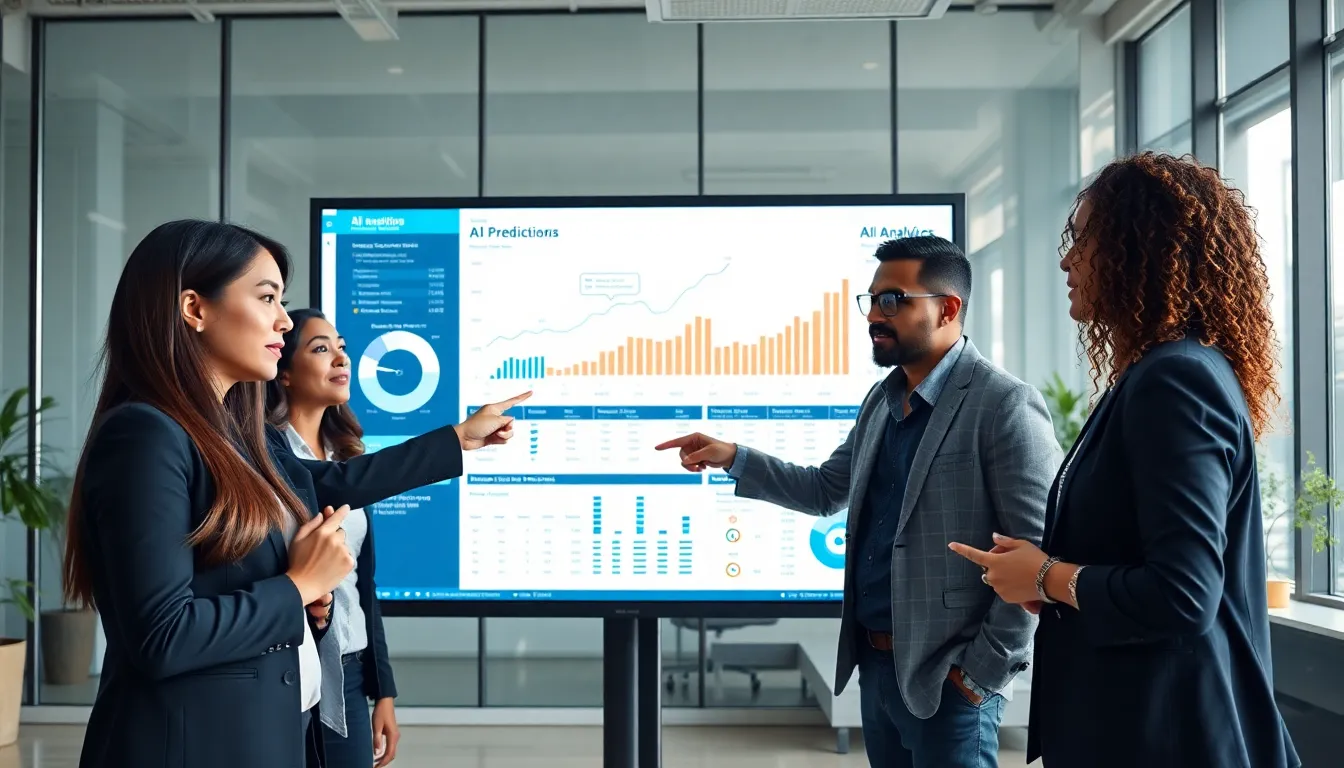Artificial intelligence is rapidly transforming the landscape of technology and society. As it evolves, experts are making bold predictions about its future impact. From revolutionizing industries to enhancing everyday life, AI holds the potential to reshape how people work and interact.
In this article, readers will explore key insights into the future of AI, examining trends and forecasts that could define the next decade. Understanding these predictions is crucial for businesses and individuals alike, as they navigate an increasingly AI-driven world. Whether it’s advancements in automation or breakthroughs in machine learning, the implications of AI are profound and far-reaching.
Table of Contents
ToggleOverview of AI Predictions
AI predictions focus on the substantial developments within technology and societal integration. Experts suggest automation will enhance productivity across various industries, including healthcare, finance, and manufacturing. By 2025, AI adoption in businesses is expected to rise by up to 50%, leading to efficiency improvements and cost reductions.
AI-powered systems will provide personalized experiences, impacting sectors like retail and education. Predictions indicate that customer service chatbots will handle up to 80% of online interactions within the next few years. In manufacturing, predictive maintenance using AI could reduce downtime by 30%, resulting in significant operational savings.
Machine learning innovations promise advancements in data analysis. With enhanced algorithms, AI systems might achieve up to 95% accuracy in complex predictive tasks, transforming decision-making processes in various fields. Additionally, natural language processing improvements will enable AI systems to understand and respond to human emotions, creating more intuitive user interfaces.
As AI continues to evolve, ethical considerations will also become prominent. Predictions point to regulations emerging to ensure responsible AI use. By 2024, over 60% of organizations might establish AI ethics boards to address concerns regarding privacy, bias, and accountability.
Overall, these trends indicate that AI will profoundly influence daily life and business operations, making it imperative for stakeholders to stay informed about advancements and emerging challenges.
Applications of AI Predictions

AI predictions manifest in various industries, transforming processes and enhancing decision-making capabilities. Businesses harness this technology to gain insights, streamline operations, and improve user experiences.
Industry-Specific Use Cases
- Healthcare: AI predictions optimize diagnostics. Machine learning algorithms analyze patient data to predict disease outcomes, improving treatment plans. Predictive analytics aids in identifying at-risk patients, allowing early interventions.
- Finance: AI predictions enhance risk management. Financial institutions leverage predictive models to analyze market trends, assess credit risks, and prevent fraud. Automated trading systems utilize real-time data to forecast market fluctuations.
- Manufacturing: AI predictions facilitate preventive maintenance. Advanced analytics detect equipment anomalies before failures occur, reducing downtime by up to 30%. Predictive supply chain management optimizes inventory levels based on demand forecasts.
- Retail: AI predictions personalize customer experiences. Retailers analyze consumer behavior to tailor marketing strategies, enhancing engagement. Inventory optimization algorithms predict trends, minimizing stockouts and overstocks.
- Transportation: AI predictions improve route optimization. Logistic companies use predictive analytics to determine the most efficient delivery paths, reducing fuel consumption and costs. Autonomous vehicles rely on AI to navigate and adapt to real-time traffic conditions.
Benefits of Implementing AI Predictions
- Increased Efficiency: Organizations streamline workflows with AI predictions. Automated processes reduce manual intervention, allowing employees to focus on strategic tasks.
- Cost Savings: Businesses experience significant reductions in operational costs. Predictive maintenance and optimized resource allocation contribute to lower overall expenses.
- Enhanced Decision-Making: AI predictions empower data-driven decisions. Access to accurate forecasts enables organizations to respond proactively to market changes and customer needs.
- Improved Customer Insights: Businesses gain a deeper understanding of customer preferences. AI-driven analytics unveil patterns that inform product development and marketing strategies.
- Competitive Advantage: Early adopters of AI predictions position themselves ahead of competitors. Leveraging advanced analytics fosters innovation and enhances market responsiveness.
Challenges in AI Predictions
AI predictions face several challenges that can hinder their effectiveness and implementation. Issues related to data quality and ethical considerations significantly impact AI’s predictive capabilities.
Data Quality and Availability
Data quality and availability directly influence the accuracy of AI predictions. Inconsistent, incomplete, or biased data can lead to erroneous outcomes.
- Inconsistency: Variations in data formats and structures across sources create challenges in integrating information.
- Completeness: Missing data points often impair the model’s ability to generate reliable predictions.
- Bias: Historical biases in data can perpetuate inequalities, affecting decision-making in sectors like finance and healthcare.
Organizations must prioritize strategies to ensure high-quality data collection and management. Investments in data governance frameworks and data cleaning processes are crucial for training effective AI models.
Ethical Considerations
Ethical considerations pose significant challenges in AI predictions, particularly concerning privacy, fairness, and accountability.
- Privacy: AI systems often require extensive data, raising concerns about user consent and data protection.
- Fairness: Predictive models can inadvertently reinforce stereotypes or discrimination if not carefully monitored.
- Accountability: Establishing responsibility for AI-driven decisions is essential as automated systems gain autonomy.
Addressing these ethical concerns requires organizations to implement robust ethical guidelines. Developing AI ethics boards and incorporating diverse perspectives in AI development is vital to fostering responsible AI practices.
Future Trends in AI Predictions
Experts foresee several emerging technologies and societal impacts as AI continues to evolve. These innovations and implications are crucial for understanding the trajectory of artificial intelligence.
Emerging Technologies
Predictions indicate that several technologies will shape the future of AI.
- Edge Computing: Devices will process data locally, decreasing latency and improving response times. This technology will enhance real-time AI applications in sectors such as healthcare and automotive.
- Quantum Computing: Quantum computers will tackle complex problems that traditional computers cannot, allowing AI algorithms to analyze vast datasets more efficiently. This leap could revolutionize fields like drug discovery and financial modeling.
- AI-Generated Content: Sophisticated AI tools will create text, images, and videos indistinguishable from those produced by humans. This capability will impact creative industries, marketing, and digital content creation.
- Autonomous Systems: Advancements in robotics and drone technology will lead to more reliable autonomous systems, influencing transportation, logistics, and delivery services. Predictions suggest increased reliance on such systems for efficiency.
- Augmented Reality (AR) and Virtual Reality (VR): Integration with AI will enhance user experiences in education and training, leading to more immersive learning environments and dynamic simulations.
Potential Impacts on Society
AI advancements offer profound societal impacts.
- Healthcare Improvements: AI’s predictive analytics will lead to more accurate diagnoses and personalized treatment plans, improving patient outcomes. Early detection through AI could result in lives saved.
- Job Transformation: AI may automate routine tasks, potentially displacing certain jobs. However, this shift can foster the creation of new job roles focused on complex problem-solving and human-AI collaboration.
- Economic Growth: Increased AI adoption is predicted to drive economic growth, with a potential contribution of $15.7 trillion to the global economy by 2030. Sectors embracing AI may experience significant productivity gains and cost reductions.
- Social Equity: AI efforts toward inclusivity and accessibility could help bridge gaps across various demographics. Predictive models may enhance access to essential services for underrepresented communities.
- Ethical Standards: As AI integrates deeper into daily life, strong ethical frameworks will become essential. Organizations are likely to prioritize transparency and accountability to address biases and privacy concerns effectively.
These emerging technologies and societal impacts indicate a transformative path for AI, shaping industries and enhancing human experiences.
The future of AI is poised to reshape industries and enhance everyday experiences. As predictions indicate a significant rise in AI adoption across various sectors, staying informed about these trends will be crucial for businesses and individuals alike.
Embracing AI’s potential can lead to increased efficiency and cost savings while fostering innovation in decision-making processes. However, addressing ethical concerns and ensuring high-quality data management will be vital for maximizing AI’s benefits.
As technology evolves, the landscape of AI will continue to present both opportunities and challenges. Stakeholders must navigate this dynamic environment to harness AI’s full potential while promoting responsible practices.



